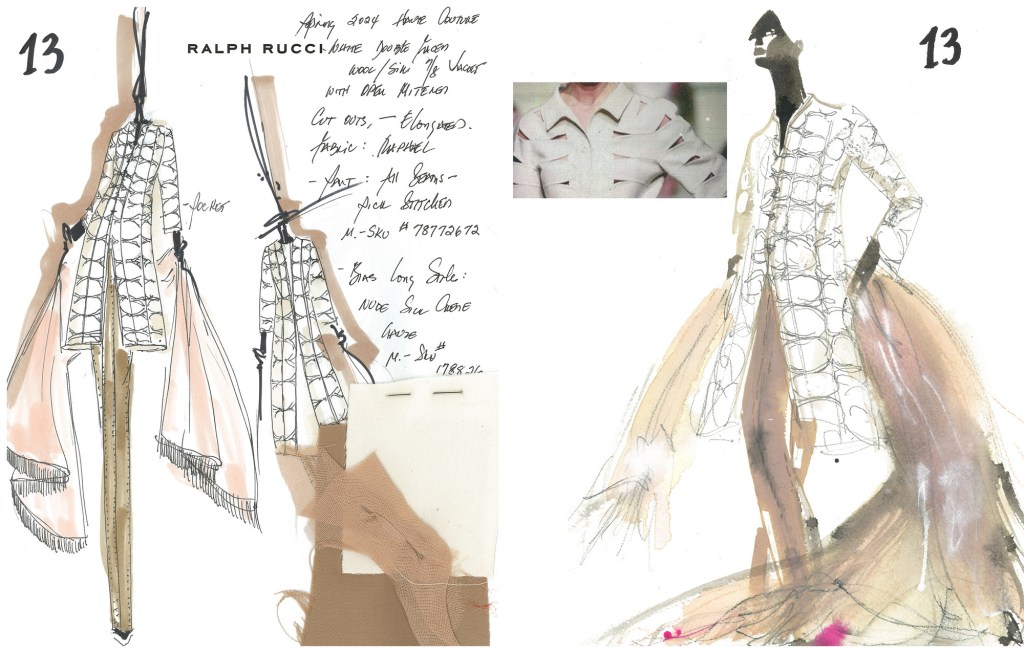Unable to travel to Paris to present his collection last month as planned due to an upcoming surgery, Rucci has released his latest designs with a digital look book. Once again, the designer has joined forces with the fashion illustrator Bil Donovan, who continues to work with top-tier clients like Dior Beauty.
Rucci set out to broaden the appeal of his label with a lightness reflected in the colors, fabrications and new techniques. Wearability is first and foremost for all of his garments, which would not happen without “the techniques that give them life,” he said. By offering softer styles, the aim is to give the wearer more possibilities to choose designs that can be styled to their liking, and to better suit their silhouettes and usages. “That’s what couture is all about — making it specific for the woman, who is ordering it,” Rucci said.
Taroni silk raincoats are among the key items, since they easily translate from day into evening. Double-faced wool and silks, as well as double-faced gauze are also integral in that they can be manipulated to be reimagined. There are also a handful of silk gorgette styles with pleated tucks and sizable panels including a a tunic, dresses and a twinset. Hand topstitching is used to stabilize the tucks, a technique that stemmed from a decade ago when Rucci was dressing one of his couture clients Madame Maria “São” Schlumberger, who once asked, “‘I am confined in the wheelchair. What can we do?’” Rucci said, adding that he decided on T-shirts and skirts in georgette, “which is a little beefier than chiffon. So she could sit in the wheelchair and never look wrinkled.”
Rucci has built on that idea for his new couture range with items like a daytime shirtwaist dress that can go from the boardroom to a dinner party. In addition, the fabric can be worn 12 months of the year. He said, “As we know, the collections really have very little to do with seasons anymore. Look at the genius of what Mr. [John] Galliano just showed for spring couture — it’s mostly fall,” Rucci said. “So we could put all of this into a given season and then work that given season’s clients for whenever she chooses to wear it.”
Rucci has created about 50 styles and pricing is consistent with a year ago. Unlike in Paris, where couture clients are not sensitive to any price increases and they feel they need to make any couture purchases in Paris, Stateside that is not the case, the designer said. Many U.S. clients balk at couture pricing in the U.S., even though they can walk into a name-brand boutique like Chanel and find a ready-to-wear outfit at $46,000, Rucci said.
Rucci and Donovan worked remotely for the first time, as opposed to being in the same room as they normally are. The designer’s interest in fashion illustration sprang from a desire to study how he could reduce the number of lines in a design. Their symbiotic sensibility is also economically sound. Rucci explained, “If I don’t have the correct amount of money to make 47 styles, and just make seven, Bill is able to convey with such drama what can be. Bill defines that point and the years that I have spent developing clients enables them to trust that the results will be correct,” Rucci said.
“Donovan’s working sketches are structured on how we are going to approach this design technically, as well as in terms of fabrics, colors and styles. The illustrator takes that information, and then usually in one wash just gets it,” Rucci said. “I always tell him, ‘Be free. Less is more.’ The feeling that Bil elicits from something so abstract has as much significance and seduction, as anything realistic. Then I tell him, ‘Mess it up even more. Put more wash on it.’“


